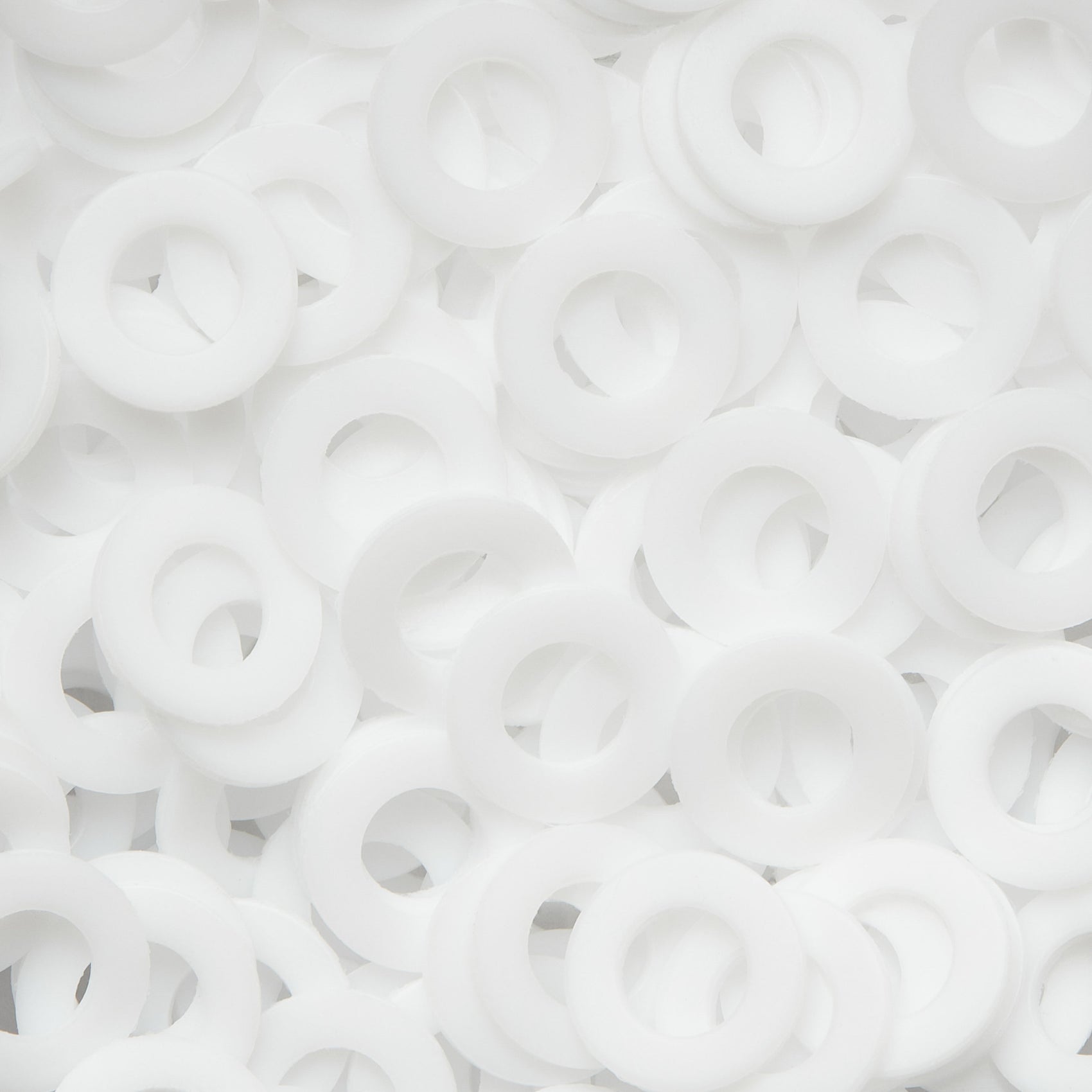Choosing the Right Sealing Solution
Washers, often overlooked components in various mechanical and industrial applications, play a crucial role in preventing leaks, controlling friction, and distributing loads. Two common types of washers used for these purposes are PTFE (Polytetrafluoroethylene) washers and rubber washers. While both serve the fundamental function of creating a seal, they differ significantly in terms of material properties, applications, and advantages. In this discussion, we'll explore the differences between PTFE washers and rubber washers, and the reasons why you might choose PTFE washers for specific applications.
Material Composition:
The primary distinction between PTFE washers and rubber washers lies in their material composition. PTFE is a synthetic polymer known for its exceptional chemical resistance and low friction characteristics. It is widely recognized by its brand name, Teflon. In contrast, rubber washers are typically made from elastomers, such as natural rubber, silicone rubber, or synthetic rubbers like neoprene and EPDM. These rubber materials are known for their flexibility and resistance to wear and tear.
Chemical Resistance:
One of the most significant advantages of PTFE washers is their exceptional chemical resistance. PTFE can withstand a wide range of corrosive chemicals, including acids, bases, and organic solvents. It is non-reactive, which makes it an excellent choice for applications where exposure to harsh chemicals is a concern. Rubber washers, while resistant to many chemicals, may deteriorate or swell when exposed to certain aggressive substances, limiting their utility in such environments.
Temperature Resistance:
PTFE washers exhibit remarkable temperature resistance, with a wide operational range from -200°C to 260°C (-328°F to 500°F). This characteristic makes them ideal for applications that involve extreme temperatures, such as in the chemical and food processing industries. Rubber washers have a more limited temperature range and may not perform well in high-temperature or cryogenic applications, where PTFE washers excel.
Friction Properties:
PTFE is well-known for its low coefficient of friction, making PTFE washers an excellent choice for applications where reduced friction is critical. This characteristic is particularly beneficial in industries like manufacturing and automotive, where minimizing friction is essential for efficient machinery operation. Rubber washers, on the other hand, typically have a higher coefficient of friction, which may be advantageous in applications requiring grip or traction.
Compressibility and Resilience:
Rubber washers are highly compressible and resilient, allowing them to conform to irregular surfaces and provide effective sealing. This feature makes rubber washers a preferred choice in applications where flexibility is essential, such as plumbing and sealing gaskets. PTFE washers are less compressible and may not conform as readily to uneven surfaces, which can be a limitation in certain sealing applications.
Electrical Insulation:
PTFE is an excellent electrical insulator, making PTFE washers suitable for electrical applications where preventing electrical conduction or interference is essential. Rubber washers may not offer the same level of electrical insulation and can conduct electricity, potentially leading to electrical issues in specific applications.
Water and Moisture Resistance:
Rubber washers are often preferred in applications requiring a high degree of water or moisture resistance. They can effectively seal against water infiltration, making them ideal for plumbing, irrigation, and outdoor applications. PTFE washers, while resistant to moisture, may not provide the same level of water sealing performance as rubber washers in some cases.
Noise Dampening:
Rubber washers have inherent noise-dampening properties due to their ability to absorb vibrations and reduce impact noise. This makes them suitable for applications where noise reduction is important, such as in HVAC systems or machinery. PTFE washers do not possess the same noise-dampening capabilities and may not be ideal in situations where noise reduction is a key consideration.
Why Choose PTFE Washers:
-
Chemical Resistance: PTFE washers are the go-to choice when dealing with aggressive chemicals and corrosive environments. Their resistance to chemical attack ensures that they maintain their integrity and sealing performance in harsh conditions.
-
Temperature Extremes: PTFE washers can handle extreme temperatures, making them indispensable in industries that require sealing solutions for cryogenic or high-temperature applications.
-
Low Friction: PTFE's low coefficient of friction is invaluable in applications where reducing friction is crucial, enhancing machinery efficiency and reducing wear and tear.
-
Electrical Insulation: PTFE's electrical insulating properties make it a preferred choice in electronic and electrical applications where preventing electrical interference or conduction is paramount.
-
Non-Contaminating: PTFE is non-reactive and non-contaminating, making it suitable for applications in the food and pharmaceutical industries where product purity is essential.
-
Biocompatibility: PTFE is biocompatible, making it a viable choice for applications in the medical and pharmaceutical fields.
When to Choose Rubber Washers:
-
Compressibility: Rubber washers excel in applications where conformability and the ability to seal against irregular surfaces are important, such as in plumbing and HVAC systems.
-
Water and Moisture Resistance: Rubber washers are preferred when sealing against water infiltration is a primary concern, such as in outdoor applications and water distribution systems.
-
Noise Dampening: Rubber washers are the choice for situations where noise reduction and vibration absorption are essential, like in machinery or HVAC equipment.
-
Cost-Effective Sealing: Rubber washers are often more cost-effective than PTFE washers, making them a budget-friendly choice for various sealing applications.
In conclusion, the choice between PTFE washers and rubber washers ultimately depends on the specific requirements of your application. PTFE washers offer unparalleled chemical resistance, temperature tolerance, and low friction properties, making them ideal for demanding environments. Rubber washers, on the other hand, are preferred for applications requiring flexibility, water resistance, noise dampening, and cost-effective sealing solutions. Understanding the differences and advantages of each material will help you make an informed decision when selecting the appropriate washer for your needs, ensuring optimal performance and longevity in your applications.

